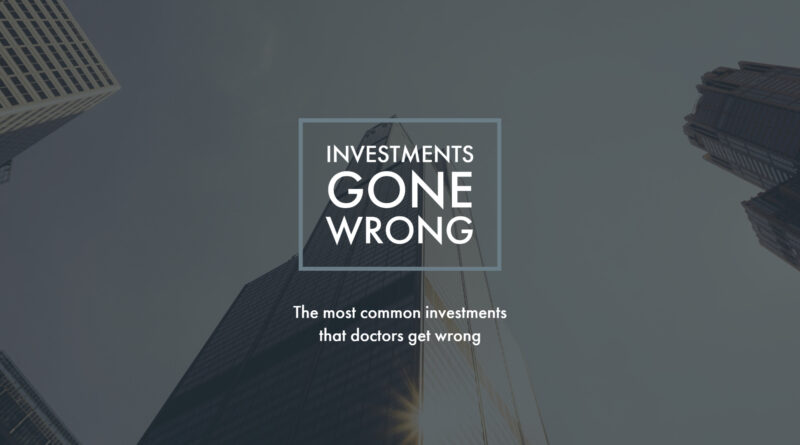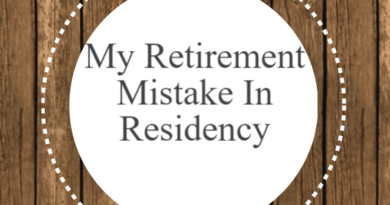Investments Most Doctors Get Wrong, Including Myself
Hindsight is always 20/20. I remember graduating from residency, starting this blog, and really trying to minimize investments that I got wrong. While I was not perfect, I would like to highlight mistakes that most doctors make. Some of these mistakes listed below are from personal experience.
Many of the reasons might not be as obvious as you think. Yes, we all know it is not a good idea to go out and buy a new speedboat right away. However, there are a lot more ways that doctors lose out on income.
Buying A House Right Away For First Job
Most people stay at their first job for an average of 2 years or less. Rent for your first job. Odds are you will build relationships and move on to a different job quite quickly. Depending on your residency it might make sense to buy or it might be a bad idea.
Even if you think you know the area, you might switch jobs. My first job was in the extreme south side of town. My current job is in the upper North part of town. With traffic, this could have easily been an hour to an hour and a half drive each way.
I loved the people I worked with and loved the job. I never thought that there would be a takeover that would turn things totally upside down.
Rent don’t buy for your first job.
Spending Big Too Early
Right around graduation time for residents and fellows, the flood of posts with nice new toys or new houses hit social media.
Buying the big house, buying a new flashy car, taking a huge international trip are just a few of the common things you will see people spend money on right after graduation.
I am not saying live like a resident forever but let a few attending paychecks hit your account before you go on a spending spree. Let your investments as a doctor work in your favor.
Life is short and it is okay to enjoy nice things. I am not hating on enjoying some of the more expensive things in life.
Just make sure you like your job and you are bringing in the income you thought you would before big spending decisions. What if you hate the job and must leave? Now you have a new boat payment, and you must figure out how to pay for malpractice tail to switch jobs.
Viewing All Debt As Bad
No one can predict the future. Who would have guessed that there are numerous stories in 2022 of people selling a one-year-old car for more than what they paid for it?
Some debt is a hedge against inflation. Some investments for doctors can be good if a small amount of debt is needed.
Your primary residence is not necessarily an investment, but it is a hedge against inflation. It is often not viewed as bad debt.
If you have a 30-year fixed mortgage, if inflation hits over 7% like it recently has, your costs are fixed other than taxes and utilities.
Taking out a commercial loan to buy the space that I practice out of added a lot of debt. However, it also is a hedge against inflation since my costs are fixed in my practice from a rent standpoint. I now know that I have guaranteed income in rent from my practice.
I do not have to worry about renegotiating my lease in 5 years like I would if I were renting.
Not all debt is bad. Buying into a surgical center that you operate out of most of the time? Maybe it makes sense to take out a loan to buy into one.
Taking An Underpaid Job
Accepting a job that underpays you because of loan repayment, academic prestige, or location will financially hurt in terms of lost earning potential long term.
While it is a wonderful path for some, if a new graduate has 400k in student loans, do not take a job making $125,000 a year living in Manhattan, that is severely going to hurt financially. Being underpaid is one of the worst investments that a new doctor can make.
Do not sell yourself short. Make sure you negotiate for your income and benefits. Loan repayment will be used as a golden handcuff to keep you employed at the position longer and to try to encourage you not to leave.
Not Thinking Like A Business Person
Medicine is a business. Most doctors suck at business.
Groups that employ doctors need you and your license to make money. Don’t undersell yourself.
Let’s take a parallel look at the construction industry. If you were a plumber and built up enough skills to be fully licensed on your own, then why would you keep being underpaid to work for someone else and make them money?
Your best performing plumbers who are fully licensed eventually wake up, realizing that they are making their bosses a ton of money, and usually end up opening their own plumbing company.
You and your license are the most valuable assets. You need to learn the business aspect of medicine to sell yourself appropriately.
Burning Yourself Out
I can’t speak for other specialties. However, for internal medicine burn out with hospital medicine is real. There is a saying. You almost never see an old hospitalist doctor.
Taking on a bunch of locum shifts and working 28 days out of the month, 12-hour shifts is a recipe for burnout.
Pace yourself, have some fun. Avoid burning out. When you think of your investments as a doctor long term, you usually think in terms of decades. It is a marathon, not a sprint.
Burning out and taking a year off will financially hurt you. It would have been better to pace yourself, take more vacation, and work more on self-care rather than chasing more dollars.
Chronic Employment Fatigue (Job Hopping)
We all know a few doctors who keep switching jobs.
It is expensive to switch jobs. The time it takes to get credentialed plus the malpractice cost of switching from one company to another adds up.
If you are constantly switching jobs every 1-2 years, really evaluate if it is really the job that is making you unhappy, or if there is something else going on in your life that is leading to this desire to search for something better.
There is downtime between switching jobs. It can take up to 6 months to get credentialed. During that time, you most likely are not going to be able to bring in any extra income.
The down time, the opportunity costs by switching jobs all the time will cost you quite a bit in lost income over time if you are constantly switching jobs.
Ignoring Investments in Tax Advantaged Accounts For Doctors
There are numerous accounts that can take advantage of lowering your taxes.
Not talking to your accountant or avoiding a retirement account such as a 401k or a Roth can severely negatively impact you years in the future.
Owning your own company and not taking advantage of tax breaks can also hurt you. Did you know that as of 2019 there is a law that gives employers the benefit of almost $5,500 in tax free contributions to your employees loans?
Our employees won by getting a raise and we got a tax break by taking advantage of this rule by not having to pay taxes on those benefits. A win-win.
Investing In Things You Have Zero Competence In
Join any physician investing community and you will see the following shilled all the time.
- Real estate passive investing
- Cryptocurrency
- Opening an aesthetics practice
- Investing in a single stock
Lots of money can be made or lost in these fields. If you do not know what you are doing, you stand to lose your entire investment.
Even arguably one of the best cardiothoracic surgeons ever, Denton Cooley, who performed the first artificial heart implantation in 1969 was not immune. He made a slew of bad real estate interments leading him to filing bankruptcy at one point in time.
Stick to what you know or else you just might lose all your investment.






Great post! Very helpful. I’m in IM (pgy2) and considering hospitalist vs. fellowship (I like pulm and critical care). But I also really don’t mind general IM and even like general medicine a lot. The things I don’t like are the things everyone else doesn’t liked but I heard sw, dispo, etc. is much better in the community. So I’d be happy either way hospitalist or fellowship as far as personal satisfaction.
My issue is more about the money. Seniors where I am are getting hospitalist offers like $300-$350k or even more for reasonable schedules etc. That’s almost $1 million lost in a 3 year fellowship, the opportunity cost, plus the time value of money, the interest on student loans accruing, and the inability to invest much money while in fellowship. So financially it seems like fellowship isn’t a good deal. But then again pulm and critical care physicians seem to be getting offers over $500k starting.
What are your thoughts about doing fellowship vs. hospitalist as far as FIRE? I read on WCI that it’s really not necessary to do a fellowship if FIRE is our goal. Any thoughts? Thanks so much!
You’re right, if FIRE is your main goal then fellowship is absolutely not necessary. The 3 years of opportunity costs is about a million dollars in pretax revenue. If you are investing some of your income and maxing out a retirement account, you are also missing out on 3 years of potential gains during that same period. Not to mention the “get started with real life factor” that in my opinion is massive. You can not get time back and enjoying your youth (or what is left) is important to me.
Go to fellowship because you love it, not because of the money aspect. The exceptions for IM might be cards and GI since really big dollar potential there.
No one knows what the market will hold in the future. Hospitalist groups have been and continue to be bought out by PE groups. My own local group now employees a lo of midlevels rather than physicians. Of course they are paying them less than MD/DOs for the same work.
The job market today looks good right now for hospitalist but who knows what the future holds. Most hospitalist are not billing enough to justify the $350k a year in income and getting a stipend from the hospital. What if those stipends stop or somehow become illegal 10 years from now? I think it really depends if you like the procedures that CC can offer you and a mix of inpatient/ outpatient with pulm/cc. Other than the acuity of illness, procedures, possibility of having a pulm outpatient practice, you are essentially running a similar schedule to a hospitalist.
I really did like being a hospitalist but for me it was the beat down from hospital admin about made up rules that really forced me out. I can only have so many meetings with admin about why my discharge metrics were not meeting their made up metrics to discharge 40% of my patients by 8am. Funny how I never saw admin in the hospital before 8am and our meetings were usually during lunch….
Pingback: The Sunday Best 03/27/2022 - Physician on FIRE
Pingback: Monday Melange, March 2022: Women’s History, The Arts, The War. – Physician In Numbers